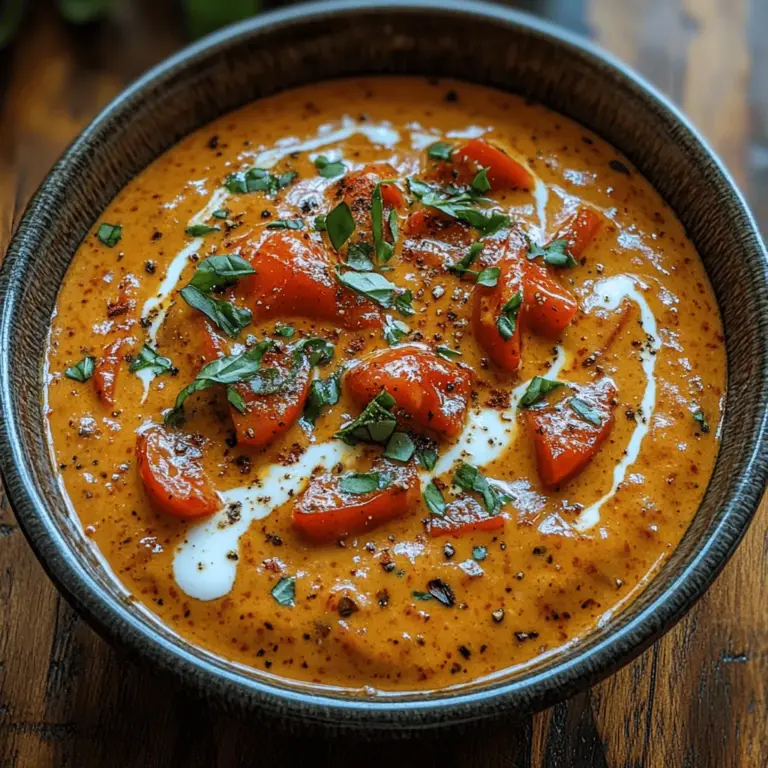Creamy Roasted Pepper Sauce: An Introduction to Culinary Delight
The allure of homemade sauces is undeniable. They have the remarkable ability to transform a simple meal into a gourmet experience, infusing vibrant flavors and textures that are often absent in store-bought alternatives. Whether drizzled over pasta, served as a dip, or used as a base for soups and stews, sauces can elevate any dish, making them a vital component of a well-rounded kitchen repertoire. Among the myriad of sauce options available, creamy roasted pepper sauce stands out as a particularly delightful addition. This rich and flavorful concoction not only tantalizes the taste buds but also brings a beautiful, vibrant color to your plate.
Creamy roasted pepper sauce combines the sweetness of roasted red bell peppers with the richness of heavy cream, resulting in a velvety texture that complements a wide array of dishes. Its versatility makes it an ideal choice for both casual weeknight dinners and elegant gatherings. As you delve into this recipe, you’ll discover how easy it is to create a sauce that can enhance grilled meats, pasta, or even serve as a luxurious dip for fresh vegetables. This sauce is not just a recipe; it’s an invitation to explore the depths of flavor that homemade cooking can offer.
Understanding the Ingredients
To craft a truly exceptional creamy roasted pepper sauce, understanding the key ingredients is essential. Each component plays a significant role in building the sauce’s distinctive flavor and texture.
Red Bell Peppers
At the heart of this recipe are red bell peppers, renowned for their rich, sweet flavor and vibrant hue. Their natural sweetness intensifies when roasted, leading to a depth of flavor that is both comforting and complex. Nutritionally, red bell peppers are packed with vitamins A and C, making them a healthy choice for enriching your meals. Their bright color not only enhances the visual appeal of your dish but also provides a nutritional boost, making them a staple in many kitchens.
Olive Oil
Next up is olive oil, a fundamental ingredient in Mediterranean cuisine known for its health benefits and flavor-enhancing properties. When sautéing vegetables or aromatics, olive oil provides a silky base that helps distribute flavors evenly. It also infuses the sauce with a mild, fruity flavor that complements the sweetness of the roasted bell peppers. Opting for high-quality extra virgin olive oil can elevate your sauce even further, as it brings a more pronounced flavor profile and additional health benefits, such as antioxidants and healthy fats.
Heavy Cream
Heavy cream is the ingredient that gives this sauce its luxurious texture and richness. Its high fat content allows it to blend seamlessly with the roasted peppers, creating a smooth and creamy consistency that coats your pasta or proteins beautifully. The creaminess balances the robust flavors of the roasted peppers, creating a harmonious blend that is both satisfying and indulgent. For those looking to lighten the dish, alternatives such as half-and-half or non-dairy creamers can be used, though they may alter the final texture and flavor slightly.
Fresh Herbs
Fresh herbs, particularly basil, play a crucial role in elevating the flavor profile of creamy roasted pepper sauce. Basil adds a fragrant and slightly peppery note that brightens the overall taste of the sauce. Fresh herbs bring a level of freshness that dried herbs simply cannot replicate. Moreover, they can be adjusted to personal preference, with options like parsley or thyme also pairing nicely with the roasted peppers. Adding herbs at the end of the cooking process ensures that their flavors remain vibrant and aromatic.
Optional Ingredients
While the foundational ingredients offer a robust flavor, consider incorporating optional ingredients such as red pepper flakes for a touch of heat. These additions can enhance the complexity of your sauce, allowing you to tailor it to your specific taste. A pinch of smoked paprika can also introduce a subtle smokiness, reminiscent of the roasting process, while a splash of lemon juice can brighten the sauce, balancing the creaminess with a refreshing acidity.
Preparation Steps for Creamy Roasted Pepper Sauce
Creating the perfect creamy roasted pepper sauce begins with the meticulous preparation of your ingredients. Each step is designed to maximize flavor and ensure a smooth, cohesive sauce.
Roasting Bell Peppers
The first step in your culinary journey is roasting the bell peppers. This process not only intensifies their natural sweetness but also contributes to the sauce’s deep flavor. Preheat your oven to 450°F (232°C) for optimal roasting conditions. Place the whole red bell peppers on a baking sheet lined with parchment paper to catch any drips. Roasting them whole allows the skin to blister and char, which is essential for developing that signature roasted flavor.
Turn the peppers occasionally to ensure even roasting, until the skin is charred and blistered, typically taking around 25 to 30 minutes. Once they are roasted to perfection, remove them from the oven and transfer them to a bowl. Cover the bowl with plastic wrap or a clean kitchen towel. This steaming process is crucial as it loosens the skin, making it easier to peel away once the peppers have cooled slightly.
Sautéing the Aromatics
While the peppers are cooling, it’s time to prepare the aromatics that will build the flavor base for your sauce. Heat a couple of tablespoons of olive oil in a skillet over medium heat. Once the oil is shimmering, add finely chopped onions. Sauté the onions for about 5 minutes, or until they become translucent and begin to caramelize. This step is vital for developing a rich, savory foundation for your sauce.
Next, add minced garlic to the skillet. Garlic contributes a warm, fragrant aroma that enhances the overall flavor profile of the sauce. Sauté the garlic for an additional minute, being careful not to let it brown, as burnt garlic can impart a bitter taste. The combination of sautéed onions and garlic will create a fragrant base that complements the sweetness of the roasted peppers beautifully.
The Role of Onion and Garlic
Onions and garlic are not just flavor enhancers; they also add layers of complexity to the sauce. Onions provide a sweet, mellow flavor when cooked, while garlic adds a pungent, savory note. Together, they create a balanced flavor foundation that will harmonize with the roasted peppers. To achieve the perfect sauté, pay attention to the color, texture, and aroma of your ingredients. The onions should be soft and translucent, while the garlic should be fragrant but not browned.
With your aromatics sautéed to perfection, you’re now ready to move on to blending the sauce, where all the carefully prepared ingredients will come together to create a creamy, flavorful delight.
{{image_2}}
Importance of Blending Techniques for Achieving Creaminess
The secret to a truly creamy roasted pepper sauce lies in the blending technique. Proper blending ensures that all ingredients are emulsified, creating a smooth and velvety texture that elevates the dish. When blending, aim for a high-speed setting to break down the roasted peppers and incorporate them with other ingredients like cream or nut-based alternatives. This process will help achieve that luxurious mouthfeel characteristic of a great sauce.
Suggested Equipment for Optimal Results
Choosing the right equipment is crucial for blending your sauce. Here are some recommended tools:
1. High-Powered Blender: Brands like Vitamix or Blendtec are excellent choices, as they can handle tough ingredients and produce a silky-smooth consistency.
2. Immersion Blender: For those who prefer a more hands-on approach, an immersion blender is perfect for blending directly in the cooking pot. This can save time and reduce cleanup.
3. Food Processor: If you don’t have a high-powered blender, a food processor can also work; just be sure to blend in smaller batches to avoid uneven texture.
How to Incorporate Ingredients Effectively for a Smooth Blend
When incorporating ingredients for your creamy roasted pepper sauce, follow these steps for optimal blending:
1. Layering Ingredients: Start by adding the roasted peppers, followed by any liquids (like broth or cream), and then add any seasonings or herbs. This layering helps the blender create a vortex that pulls the ingredients down for a thorough blend.
2. Adding Liquids Gradually: If your sauce is too thick, add liquids gradually while blending. This method allows you to control the consistency better and avoid making the sauce too runny.
3. Pulse Before Blending: If using a food processor, pulse the ingredients a few times before blending continuously. This initial pulse helps break down larger chunks of pepper and makes it easier for the processor to create a creamy texture.
Heating and Adjusting the Sauce
Once you’ve blended your sauce to perfection, it’s important to gently heat it to meld the flavors together. This step is crucial in enhancing the taste of your creamy roasted pepper sauce.
The Importance of Gentle Heating for Flavor Melding
Heat the sauce over low to medium heat in a saucepan. This gentle warming allows the flavors to mingle without boiling, which can affect the texture and taste. Stir frequently to ensure the sauce heats evenly and doesn’t stick to the bottom of the pan.
Tips for Seasoning Adjustments
Seasoning is a personal preference, so it’s important to taste and adjust as you go. Here are some tips:
– Start with Salt: Add salt gradually, tasting after each addition. This step helps you achieve the desired saltiness without overpowering the sauce.
– Use Fresh Herbs: Fresh basil or parsley can brighten the flavors. Add them towards the end of cooking to maintain their freshness.
– Balance with Acid: If the sauce feels flat, consider adding a splash of vinegar or lemon juice to brighten the overall flavor.
How to Taste and Modify the Sauce to Suit Individual Preferences
Tasting your sauce is vital. Here’s how to modify it based on your preferences:
– Too Acidic? Add a touch of sugar or honey to balance the acidity.
– Too Thick? Gradually whisk in a bit of broth or cream until you reach the desired consistency.
– Too Mild? For a bolder flavor, consider incorporating roasted garlic or additional spices.
The Impact of Balsamic Vinegar on Flavor Balance
Balsamic vinegar is a fantastic addition for those looking to enhance flavor depth. It provides a sweet yet tangy note that complements the roasted peppers beautifully. Start with a teaspoon and adjust according to taste. The key is to balance it with the creaminess of the sauce without letting it overpower the main ingredients.
Adding Spice with Red Pepper Flakes for Those Who Enjoy Heat
For spice lovers, red pepper flakes can elevate your creamy roasted pepper sauce to new heights. Begin with a pinch and adjust according to your heat tolerance. Remember that the spice level can intensify as the sauce simmers, so taste frequently to ensure it meets your preference.
Serving Suggestions for Creamy Roasted Pepper Sauce
Once your sauce is ready, it’s time to present and enjoy it! Here are some serving suggestions that highlight its versatility:
Presentation Ideas for Serving the Sauce
– Drizzle Over Pasta: Pour the sauce generously over your favorite pasta. A sprinkle of fresh herbs or grated cheese on top adds a nice finishing touch.
– Garnish with Fresh Ingredients: Consider garnishing with freshly chopped basil, parsley, or even a few roasted pepper slices for a pop of color.
Best Pairings with Pasta, Grilled Meats, and Vegetables
This creamy roasted pepper sauce pairs wonderfully with:
– Pasta: From fettuccine to penne, any pasta will soak up the rich flavors.
– Grilled Meats: Serve as a sauce for grilled chicken, pork, or steak. The smoky notes of the meat complement the sweetness of the roasted peppers.
– Vegetables: Drizzle over roasted or steamed vegetables like zucchini, asparagus, or broccoli for a deliciously colorful and nutritious dish.
Creative Uses Beyond Traditional Serving Suggestions
Your creamy roasted pepper sauce isn’t limited to just being a pasta sauce. Here are some creative uses:
– Dip: Serve it as a dip with fresh vegetables, breadsticks, or pita chips.
– Dressing: Thin it out with a bit of olive oil and vinegar to create a zesty salad dressing.
– Spread: Use it as a spread on sandwiches or wraps to add a burst of flavor.
Nutritional Information and Dietary Considerations
Understanding the nutritional information of your creamy roasted pepper sauce can help you make informed decisions, especially if you’re following specific dietary considerations.
Overview of the Nutritional Benefits of the Ingredients Used
The primary ingredients in this sauce contribute a variety of nutritional benefits:
– Roasted Red Peppers: Low in calories and high in vitamins A and C, they provide antioxidants that support overall health.
– Heavy Cream: While delicious, it’s high in calories and saturated fat. Consider alternatives if you’re watching your intake.
– Olive Oil: Rich in healthy fats, it promotes heart health and adds flavor.
Discussion of Dietary Alternatives (e.g., Dairy-Free Substitutes for Heavy Cream)
If you want to make a lighter or dairy-free version of the sauce, consider these alternatives:
– Coconut Cream: A great substitute that adds a lovely sweetness and creaminess.
– Cashew Cream: Blend soaked cashews with water to create a thick, creamy base that is both nutritious and delicious.
– Almond Milk or Soy Cream: These can be used to replace heavy cream, maintaining a creamy texture without the dairy.
How to Make the Sauce Healthier Without Sacrificing Flavor
To make your creamy roasted pepper sauce healthier, try these tips:
– Reduce the Amount of Cream: Use half the amount of heavy cream and replace it with vegetable broth or a dairy-free alternative.
– Increase Vegetables: Add steamed spinach or sautéed mushrooms to boost the nutritional content while enhancing the flavor and texture.
– Use Whole-Grain Pasta: If serving with pasta, opt for whole-grain varieties to increase fiber and nutrients.
Conclusion
In summary, creamy roasted pepper sauce is a versatile and delicious addition to many dishes. Its ease of preparation and flexibility makes it a favorite among home cooks. Whether you use it as a pasta sauce, a dip, or a dressing, this recipe encourages creativity in the kitchen.
As you experiment with different variations, you’ll discover personal touches that make the sauce uniquely yours. Embrace the joy of cooking with fresh ingredients and homemade sauces, and don’t hesitate to adapt this recipe to fit your taste preferences. Enjoy the flavorful journey that creamy roasted pepper sauce offers!


